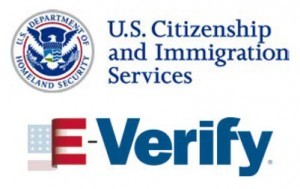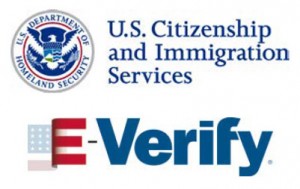 Under a new California law that took effect on January 1, 2016, California employers may face civil penalties of up to $10,000 for misusing E-Verify, the federal electronic employment verification system some employers use to verify employment eligibility of newly hired employees. The new California E-Verify law makes it more difficult for some employers to comply with both federal and state laws relating to workers’ employment eligibility.
Under a new California law that took effect on January 1, 2016, California employers may face civil penalties of up to $10,000 for misusing E-Verify, the federal electronic employment verification system some employers use to verify employment eligibility of newly hired employees. The new California E-Verify law makes it more difficult for some employers to comply with both federal and state laws relating to workers’ employment eligibility.
Federal law makes it unlawful for an employer to hire an individual who is not legally authorized to work in the United States, or to continue to employ an individual knowing the individual is or has become unauthorized to work in the United States. Federal law also requires that the employer and employee complete and sign, under penalty of perjury, an Employment Eligibility Verification form – commonly known as an “I-9” form – attesting that the individual is authorized to work in the United States.
The E-Verify system is a free online system operated by the U.S. Citizen and Immigration Services (“USCIS”) and the Social Security Administration (“SSA”). E-Verify confirms an individual’s identity and employment eligibility by comparing the information entered on the individual’s I-9 form against records maintained in the SSA and USCIS databases. Once the information is entered into E-Verify, the system provides either of two results: “Employment Authorized” or “Tentative Non-Confirmation” (“TNC”). A TNC notification means the information entered into E-Verify did not match the government databases.
Most California employers are not required to use E-Verify. In 2012, it became unlawful in California for the state or a city, county, or special district to require an employer to use an electronic employment verification system, such as E-Verify. However, some California employers, such as those performing work under a federal contract, may be required by federal law to use E-Verify.
The new California E-Verify law is primarily aimed at employers who choose to use E-Verify without being required to do so under federal law or as a condition of receiving federal funds. The following list summarizes the key provision of the new law:
- NO use of E-Verify before an offer of employment has been made. It is unlawful for an employer to use E-Verify to check the employment authorization status of an applicant who has not been offered employment, unless required by federal law or as a condition of receiving federal funds.
- NO use of E-Verify on existing employees. It is unlawful for an employer to use E-Verify to check the employment authorization status of an existing employee, unless required by federal law or as a condition of receiving federal funds.
- Okay to use E-Verify after an offer of employment has been made.An employer may use E-Verify to check the employment authorization status of a person who has been offered employment.
- Employer must provide employee with TNC notification.If an employer receives a TNC notice, the employer must, as soon as practicable, give the employee any TNC or any notification issued by the SSA or Department of Homeland Security containing information specific to the employee’s case.
- Civil penalties of up to $10,000.An employer who violates the new E-Verify law may face a civil penalty of up to $10,000 for each violation. “Each unlawful use of the E-Verify system on an employee or applicant constitutes a separate violation.
Given that each unlawful use of the E-Verify system constitutes a separate violation for purposes of the new law’s penalty provision, an employer with non-compliant practices could quickly accrue significant penalties. Accordingly, California employers who use the E-Verify system should review their practices to ensure compliance.

